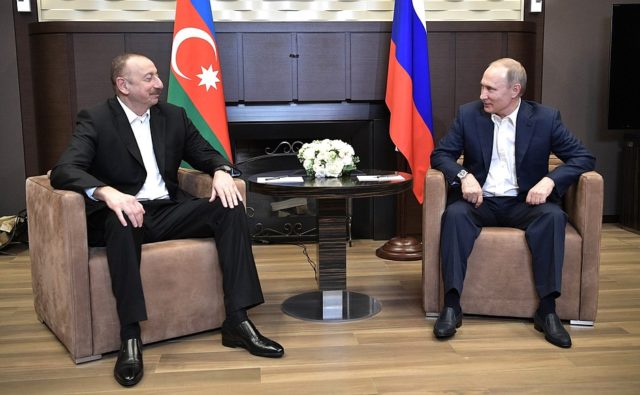
Moscow Signals a Not-so-Subtle Tilt Toward Baku
Publication: Eurasia Daily Monitor Volume: 16 Issue: 36
By:

Moscow’s recent decision to extradite a Talysh activist to Azerbaijan was a not-so-subtle sign that reinforced previous impressions the Russian government is tilting away from Armenia and toward Azerbaijan in the South Caucasus. The Kremlin is anything but happy with Yerevan’s new government (see EDM, May 3, 2018; October 1, 2018). Moreover, the final piece of the North-South transit corridor between Russia and Iran has just fallen into place (see EDM, November 9, 2017; February 26, 2019), which makes Azerbaijan far more strategically important to Russia than ever before. Against that geopolitical background, Moscow’s move against the Talysh leader is reverberating in both Yerevan and Baku, and each is likely to act in the coming months on the basis of that understanding. Still, no one’s position has crystallized quite yet. It is entirely possible Moscow could again tack in another direction to maintain the tensions between Azerbaijan and Armenia over Karabakh—an unresolved conflict that has been critical to the maintenance of Russian influence in the region.
Two weeks ago (February 28), Russian authorities extradited Fakhraddin Abozoda (Abbasov) to Baku at Azerbaijan’s request (Kavkazsky Uzel, March 1; Infoteka24.ru, March 8; Nashaarmenia.info, March 10). For 25 years, Abozoda has been one of the most prominent leaders of the Talysh movement in Azerbaijan. Notably, he was involved with the short-lived Talysh-Mughan Autonomous Republic in 1994, and has had a role in all succeeding efforts to achieve autonomy for the members of this 600,000-strong minority inside Azerbaijan. Some of those endeavors were supported by Russia, and all of them had the backing of Armenia. Both countries viewed the Talysh movement as a check on Azerbaijani power (Realtribune.ru, October 21, 2018; Nar.am, April 4, 2016; Windowoneurasia2.blogspot.com, October 22, 2018 and April 5, 2016). In 2018, the Azerbaijani authorities issued an arrest warrant for Abozoda, accusing him of having visited Armenia, allegedly meeting with Armenian special services, and having made “statements online against Azerbaijan and its territorial integrity” (Jam-news.net, March 2).
Now, however, Moscow has decided to agree to one of Baku’s long-standing requests—to extradite Abozoda—which the Talysh as well as their backers in Russia and Armenian view as a betrayal. They say, the Talysh and the Armenians will be weakened and Moscow will receive nothing in return for fulfilling the request. Specifically, Alakram Gummatzoda, another prominent Talysh leader, says that anyone who thinks Azerbaijan will change its foreign policy because of this is being “naïve” (Aravot-ru.am, March 13; Kavkazgeoclub.ru, March 2). Instead, the argument goes, Baku will simply pocket the successful extradition and continue to press for its own goals with no regard for the rights of this ethnic minority or any change in direction vis-à-vis Moscow or Yerevan.
One way or the other, Armenians are reading the situation as a major shift in Moscow’s position toward their country and their nation. Andzhela Elibegova, a Yerevan-based specialist on Azerbaijan says the extradition of Abozoda shows that Baku intends to intensify its pressure against anyone in Azerbaijan with even a hint of pro-Armenian sympathies—and that Azerbaijan is willing to go after such people anywhere in the post-Soviet space. Specifically, she tells Aravot.am that Abozoda’s extradition represents “a precedent” and that “Armenians no longer are safe in the post-Soviet countries” (Aravot-ru.am, March 11).
To the extent other Armenians draw the same conclusion, it will make the new Yerevan government even more likely to move away from Russia on the assumption that Russia is moving away from them and toward Azerbaijan. This further complicates Moscow’s efforts to play Armenia and Azerbaijan off against one another by leading one side to conclude that the Russians are on its side and not the other’s.
Why then did Moscow take this step? Possibly, some in the Russian elite were paid off, Gummatzoda suggests; in which case, the handover does not in fact represent a major shift in Russian policy (Aravot-ru.am, March 13). But three other explanations are more likely. First, sacrificing someone Yerevan has long supported is yet another way for Moscow to show Armenia how unhappy it is with that South Caucasus country’s new course under Prime Minister Nikol Pashinyan. And it is a reminder that Moscow could do even more against Armenian interests if Yerevan does not change direction.
Second, it could be an effort by the Kremlin to recover some of the standing it had lost with Baku as a result of Moscow’s restrictions on Azerbaijani diaspora activities in Russia. Thus, it is part of reasserting what the Kremlin views as a winning strategy of promoting Slavic-Turkic unity in small and large ways (Moderator.az, December 2, 2018). Extraditing the Talysh leader helps to soothe some of the anger over Russian pressure against the Azerbaijani diaspora while calling attention to good relations between the two countries’ leaders, Vladimir Putin and Ilham Aliyev.
And third, and perhaps most importantly, it may simply be a product of Azerbaijan’s new importance to Moscow as a transit route to Iran. The planned North-South Corridor has become more important to the Russian Federation given Western sanctions, and it is becoming more of a reality with the recent opening of a key rail section between Kazvin and Resht, in Iran. Moscow has long promoted this connection; and since the rail lines between Iran and Russia pass through Azerbaijan, Baku naturally now has more leverage. Russia’s extradition of a domestic opponent of the Aliyev government is a small contribution to enhancing this Russian-Azerbaijani cooperation (Casp-geo.ru, March 6).
Again, this Russian action does not necessarily mean Moscow is about to abandon its positions on Karabakh or that Baku is about to fall permanently into the Russian column. In each case, too many factors work against such outcomes. But in the complex geopolitical environment of the Caucasus, such small moves often cast a large shadow; and the extradition of Abozoda may come to be seen as one such turning point.



